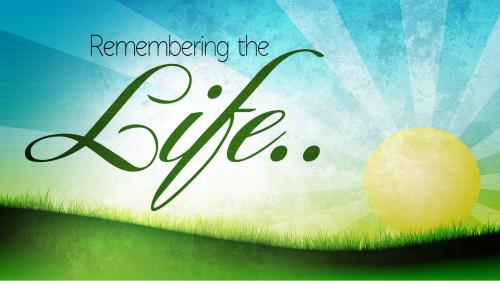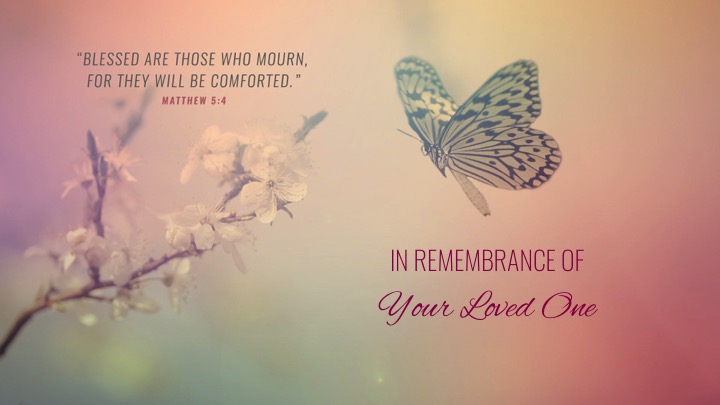-
Funerals And Parties Series
Contributed by Robert Leroe on Nov 28, 2017 (message contributor)
Summary: We learn much from times of sorrow and loss, times when we are confronted with the reality of death, opportunities when we can learn from God
“A good reputation is more valuable than the most expensive perfume. In the same way, the day you die is better than the day you are born. It is better to spend your time at funerals than at festivals. For you are going to die, and you should think about it while there is still time. Sorrow is better than laughter, for sadness has a refining influence on us. The heart of the wise is the house of mourning, but the heart of fools is in the house of pleasure. A wise person thinks much about death, while the fool thinks only about having a good time now...Finishing is better than starting.” >Ecclesiastes 7:1-4, & 8
These may sound like dark words, but they contain profound wisdom. People deny death, refuse to face it, and are reluctant to attend funerals. We often view life as God’s greatest gift, and we regard death as the worst that could happen. Most people avoid thinking about death, yet the writer of our text says that they’d be better off spending some time at funerals, because they need a reality check. The Bible says that there is value in suffering and sorrow. We learn more from difficult times than happy times. If we view death with the eyes of faith, we see that death is the best of all possible events…because this life is a mere rehearsal for the life to come. Heaven is real, and is glorious. This is why the day of our departure is better than the day of our birth. I wish I could paint a picture of Heaven, but all I know is what Scripture says, and the writers use mostly poetic language. Trying to describe Heaven to us is like trying to describe this world to an unborn child. All we really know is that if we’re living for God, the best is yet to come.
How we live in however many days we’re given matters. Do you ever think of what people might say about you at your funeral? What kind of eulogy might you be given? Humorist Garrison Keillor once said that at his funeral he wants people to weep uncontrollably with abject despair! We hope people will miss us, and that they will think well of us. We covet having “a good reputation,” as our reading states. There’s a play on words in the text, “A good reputation is better than the most expensive perfume.” The Hebrew word for “reputation” is shem, and the Hebrew word for perfume is shemen. Though perfume may help make us attractive, a good reputation is better. Perfume doesn’t last; it’s temporary, but a good reputation lasts even after we’re gone. We may not be able to afford a bottle of Channel No. 5, but we will spare no expense to maintain a good reputation. We hope to reach the end of our days with no regrets. How we live matters.
Why are funerals better than parties, according to Ecclesiastes? At parties we escape reality, we try to forget our cares…at funerals we come face-to-face with the meaning of life. A party may be a good occasion to blow off some stress, but a funeral is a place to reflect and learn what life is really about—this is an occasion to prepare for the day when we too will depart and stand before God.
Folksinger Phil Ochs would end his concerts with a song that said, “My pen won’t write a lyric line when I’m gone, so I guess I’ll have to do it while I’m here.” I suspect that if we knew we only had a year or so left on this earth, it would change how we live. When I was stationed in Europe, I knew of fellow soldiers who would scramble their last few months to visit places they neglected to see; they had come to the realization that they had but few remaining opportunities left to go sightseeing. The time to live is now--we don’t know what tomorrow will bring. More importantly, the Bible says that the time to believe, to trust God, is Today, while we hear God’s voice; tomorrow may be too late. The body is not a home; it’s more like a hotel, a place where we dwell only briefly.
Rather than pursue empty pleasures and seek a comfortable life, we need to pursue holiness and seek God. If we reach the end of our days with faith and a good reputation, it shows that we know the true value of things. Many people live in an escapist culture, and have constructed for themselves an oppressive, materialistic prison whose spiritual emptiness is all too apparent. Comfort isn’t as important as is living well, with integrity, and that may mean often being uncomfortable--enduring hardship, struggle, adversity. A person with character can truly say that the day of death is better than the day of birth.

 Sermon Central
Sermon Central



